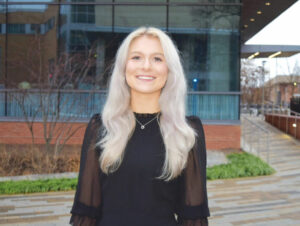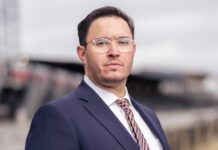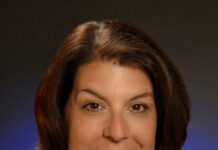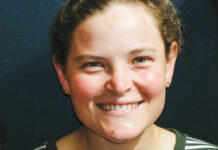
As a teenager, Anna Adelstein spent a lot of time in doctor’s offices. While her mother was sick, Adelstein learned from her doctors and became inspired by them. When Adelstein was 17, her mother died.
Now, she strives to commemorate her mother’s life through her work in medicine.
After growing up in Pikesville and graduating from Beth Tfiloh Dahan Community School in 2021, Adelstein continued her education at the University of Maryland, Baltimore County. Adelstein plans to graduate in 2025 with a bachelor’s degree in biochemistry and molecular biology. After graduating, Adelstein hopes to pursue a M.D.-Ph.D.
Adelstein, 21, lives in Catonsville and belongs to Beth Tfiloh Congregation.
Why do you need an M.D.-Ph.D.?
The physician scientist degree is gaining a lot of traction recently. It is a very a niche position to be in because you have both the Ph.D. and the M.D. With the Ph.D., you get more of a deep thorough research background. That helps with lab skills and is a different way of thinking.
Research makes you think subjectively about a matter, but through my M.D., I’ll have more of a subjective view of oncology and cancer. I’ll be seeing patients, meeting with their families and seeing how the research that I do and the work that I do really does affect people’s lives. I want to have the dual degree because I really love research and I have so much passion for it, but the M.D. makes it a little bit more personal.
How long is this academic plan?
So, the M.D.-Ph.D. track is 8-10 years. I’ll be in graduate school until I’m around 32, and then I’ll do a residency and then an oncology fellowship. Then, we’ll see where it takes me.
What research do you conduct outside of class?
I work in the Summers lab at UMBC. Dr. [Michael] Summers is a Howard Hughes Medical Institute investigator. We study HIV, particularly in a biochemistry and structural biology lab. The biggest issue with HIV treatments now is a lot of them target the early phase of the virus’s life cycle. Because of social implications and the fact that it’s a retrovirus, the virus is rapidly mutating, and it may in the future resist current treatments. We want to be able to characterize different aspects of the virus’s life cycle to target them for future treatments.
How did you hear about this originally?
At UMBC, I’m in the Meyerhoff Scholars Program, which is a program specifically designed to help people get an M.D.-Ph.D. It introduces you to this world of research. That’s why I decided to go to UMBC because of the research opportunities that they had and because they have programs like the Meyerhoff that help better the future of STEM.
What made you decide to go into this work originally?
My mom unfortunately passed away when I was 17 years old. When I was a teenager, I used to do her immunotherapy treatments. So, every week I would go and get the little needle in the pump, and I set up the whole contraption. It really struck me how that took 20 minutes of my day each week, but it was something that really helped improve the longevity of her life and it allowed her to go out in public without the fear of getting sick because these treatments literally built her immune system. That got me really interested in immunology and I was always really interested in science. Then, after my mom passed away, I wanted to pursue something that would honor her history and her legacy. She was a three-time cancer survivor, so that’s why I want to go into oncology. I saw the interactions that she had with her physicians that were so special and made her feel so comforted. I want to be able to do that for somebody like they were able to do for my mom. I want to pursue a career in research and help to learn more about cancer and especially the intersection between the fields of oncology and immunology. That’s pretty much my motivation for everything that I do.
Will you have opportunities to have jobs during graduate school?
The M.D.-Ph.D. program is cool. There’s this program through the [National Institutes of Health] called the MSTP, which is the medical student training program. Basically, throughout your M.D.-Ph.D., it is fully funded, and you receive a stipend of around $40,000 a year. It’s a good deal. Medical school’s free, and your Ph.D. is free, too.
Outside of work and school, what do you do for fun?
I like to run. I have a running streak right now that I started June 13 of 2022. So, I’ve run every single day since. I think that’s a little over a year and six months.
How did you feel about staying in Baltimore for college?
UMBC was not initially on my radar until I learned more about the research opportunities and the scholarship programs. Honestly, I really think that going to UMBC was such a blessing because I’m close with my family, and my dad and I are particularly close. He works a mile from campus, so we’re always getting lunch and things. It’s nice, especially given the circumstances of my mom passing away towards the end of my high school career. Being close to family like that and to have my dad around has been a blessing for sure. I’m not super involved in the Jewish community at UMBC but knowing that Pikesville is that short distance away and I can go back to that is nice.
How would you describe your personal relationship with Judaism?
I’m a very spiritual person. Growing up going to Beth Tfiloh, I really embraced the Judaic curriculum that we have. I still have my siddur by my bedside table every day. I think that through my mom’s passing, I became more spiritual. The way that the Jewish community joined around me and my family and gave us a support system from our community really made me feel a lot closer to the culture of the religion and my Jewish heritage.







